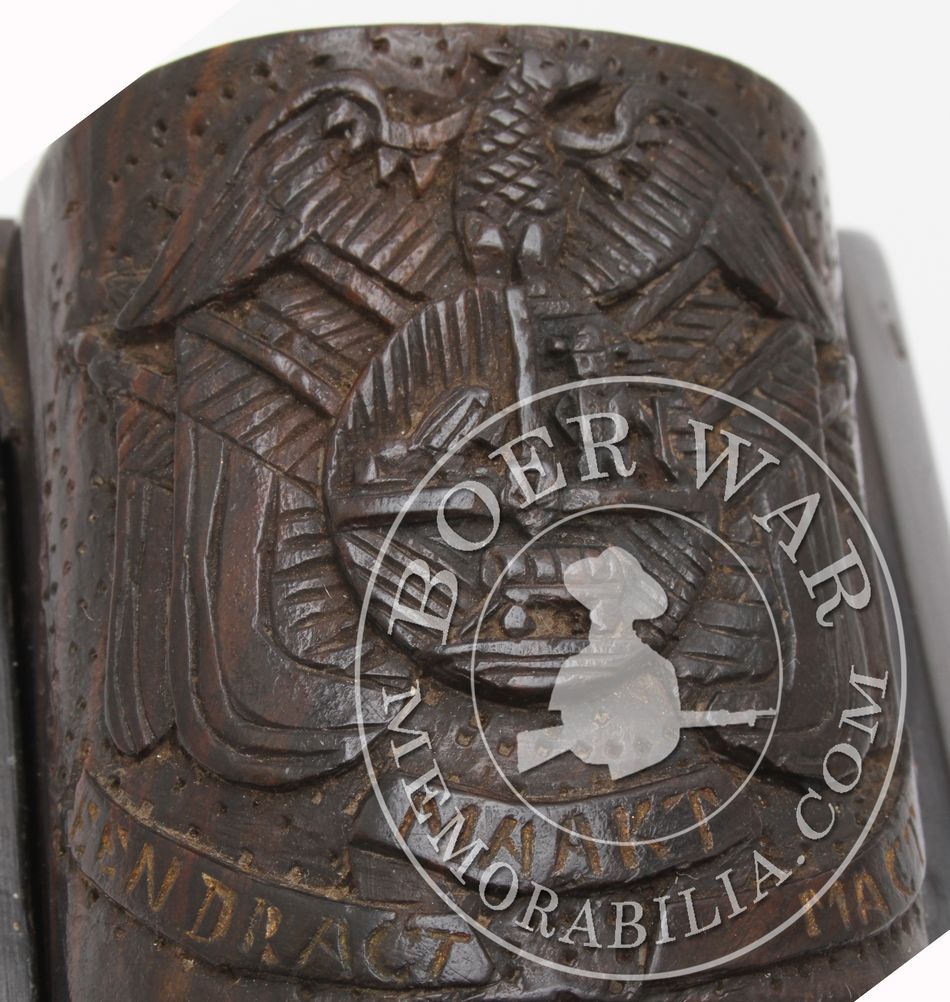|
View the embedded image gallery online at:
https://boerwarmemorabilia.com/index.php/memorabilia/pow-art/item/95-paperweight-2-boer-pow#sigProIde63a415667 |
Item Ref# PS7121
Paperweight 2 - Boer POW
Brief description: This is a paper weight made by a Boer POW with the Coat of Arms of the Zuid Afrikaansche Republiek (ZAR). It is furthermore enhanced in that it has a lid that opens to reveal two trays for stamps. Material: Wood "Eendragt Maakt Magt" “Diyatalawa” "Ceylon 1902" "Boerenkamp"
|

Boer Die-Hards: The "Irreconcilables"
While the authorities seemed to wait until patience and good sense would have their regard, the public were beginning to look upon the very idea of keeping these helpless men prisoners in the Island as possessing a good deal of humour about it.
"What could they do against the might of the British Power?" asked one person. "Do they count at all", asked another. And then the clamour went up: "Why should they not be permitted to go where they like and do what they like, rather than be subjected to these childish punitive precautions! In this, as in not a few other public opinions concerning the Boerprisaners«of-war, the authorities decided to abide by the voice of the people."
On the 24th of September, 1903, the Secretariat issued the communiquè notifying the release of the remaining five Boers incarcerated at Diyatalawa, stating that "they are now free to go anywhere they liked in or out of the Island except to South Africa". When they took the oath, they can go to South Africa."
Simultaneously with this order two of them, van Rooyen and Bacgot, were brought under escort to Colombo, put on board the S.S. Lady Haveloak and landed at Jaffna; Engelbrecht and Rogers were escorted and left at Hambantota; while Geldenhuis was taken to Batticaloa and given his freedom.
Thus separated and in pastures new, but perhaps less pleasant, on the north, south and east of Ceylon, they were left to meditate on their lot. They continued to receive a bounty from Imperial Funds, of two rupees a day as a "living allowance". Stranger still, it was made known that the allowance would be paid to them only at the revenue stations to which they had been posted at the time of their release.
Very naturally, these strangers in strange surroundings who could hardly speak any language but their native "taal", were a source of great interest to the local people. The grey headed old man banished to Batticaloa was destined to the loneliest existence of them all. He refused to exchange it, turning down even a personal appeal from General Da-la-Rey who telegraphed from India asking him to take the oath of allegiance. He took a delight in bathing in the lake and fishing. He also apparently enjoyed a fish tiffin, to judge from the catch he was known to make inthe morning, which he proceeded to cook and eat under the shelter of a tree. One curious mannerism of this veteran, which amused the people of Batticaloa a good deal, was his habit of keeping his topee on, even when inside a house. Opinion seemed divided as to whether he took his boots off when he went to bed! But the anguish and tribulation of this aged exile was destined to be of short duration.
He died about the middle of 1904.
The Jaffna climate, and separation from his comrades, seemed to have worked a change in van Rooyan and Bacgot. Although still very bitter against the British, they decided to take the oath. Two passages were found for them on the Natal Line S.S. Umkuzi and they sailed for their home, to rejoin their families, sufficiently primed to impart a strange story to their children, and their children's children
Boere Krygsgevangenes in Ceylon
Journal of the Dutch Burger Union of Ceylon
| Scripture |
|
You will be secure, because there is hope; you will look about you and take your rest in safety. You will lie down, with no one to make you afraid, and many will court your favour. Job 11:18-19 |

